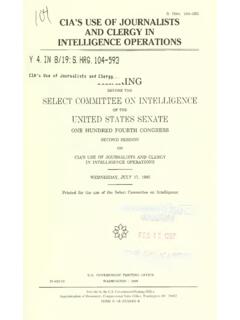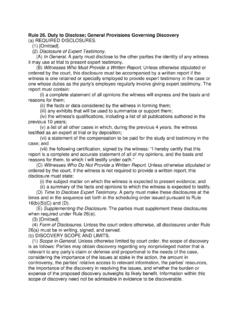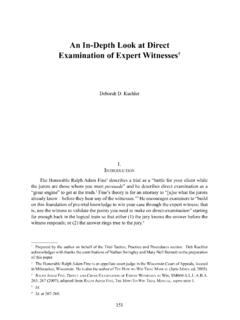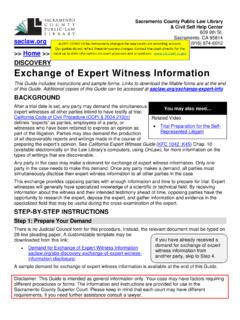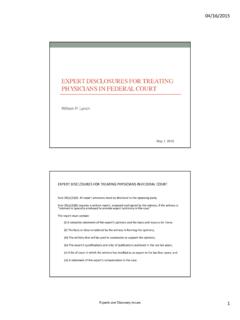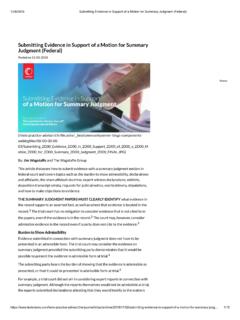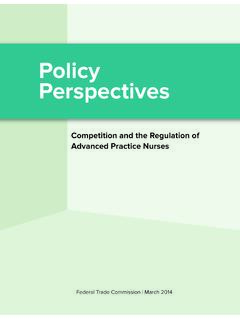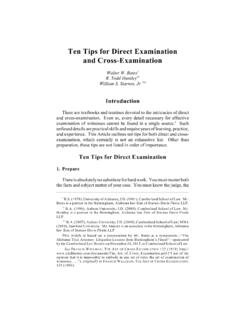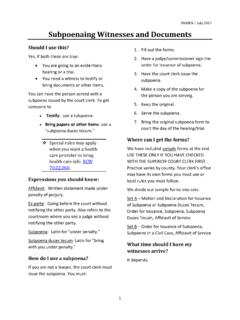Transcription of SELECT COMMITTEE ON INTELLIGENCE UNITED STATES SENATE
1 COMMITTEE SENSITIVE -RUSSIA INVESTIGATION ONLY 116TH CONGRESS 1st Session SENATE (U)REPOR T OF THE REPORT 116-XX SELECT COMMITTEE ON INTELLIGENCE UNITED STATES SENATE ON RUSSIAN ACTIVE MEASURE;S CAMPAIGNS AND INTERFERENCE IN THE 2016 ELECTION ' VOLUME 2: RUSSIA'S USE OF SOCIAL MEDIA WITH ADDITIONAL VIEWS 1 COMMITTEE SENSITIVE -RUSSIA INVESTIGATION ONLY COMMITTEE SENSITIVE-RUSSIA INVESTIGATION ONLY CONTENTS I. (U) INTRODUCTION .. 3 II. (U) FINDINGS .. 4 III. (U) THE REACH OF SOCIAL MEDIA .. 8 IV. (U) RUSSIAN USE OF DISINFORMATION .. 11 A. (U) Russian Active Measures.. 12 B. (U) Russia's Military and Information Warfare .. 13 C. (U) Russia's Weaponization of Social Media .. 14 D. (U) Russian Social Media Tactics .. : .. 15 E. (U) Features of Russian Active Measures .. 20 V. (U) THE INTERNET RESEARCH AGENCY .. 22 A. (U) Y evgeniy Prigozhin and the Kremlin .. 23 B. (U) IRA Operations ..' .. 24 C. (U) The Role of the IRA Troll .. 25 D. (U) Troll Narratives.
2 28 VI. (U) IRA ACTIVITIES AGAINST THE UNITED STATES IN 2016 .. 29 A. (U) Origins of IRA Activity in the UNITED STATES .. 29 B. (U) IRA Operations Explicitly Targeting the 2016 Election .. 32 C. (U) Other IRA Operations Targeting Politicians and Society .. 37 D. (U) IRA Use of Paid Advertisements .. 40 E. (U) The IRA Information Warfare Campaign .. 41 F. (U) Ongoing IRA Activities .. 42 VII. (U) IRA USE OF SOCIAL MEDIA BY PLATFORM .. 43 VIII. (U) OTHER RUSSIAN SOCIAL MEDIA INFORMATION WARFARE EFFORTS .. :. 63 A. (U) Main INTELLIGENCE Directorate (GRU) .. 63 B.. 69 C. (U) Other Russian Government Activities .. 70 IX. (U) GOVERNMENT RESPONSE .. 71 X. (U) THE COMMITTEE 'S REVIEW OF RUSSIA'S USE OF SOCIAL MEDIA .. 76 XI. (U) RECOMMENPATIONS .. 78 A. (U) Industry Measures .. 78 B. (U) Congressional Measures .. 80 C. (U) Executive Branch Measures .. 81 D. (U) Other Measures .. : .. 81 XII. (U) Additional Views of Senator Wyd~n .. , .. 83 2 COMMITTEE SENSITIVE -RUSSIA INVESTIGATION ONLY L_ COMMITTEE SENSITIVE -RUSSIA INVESTIGATION ONLY I.
3 (U) INTRODUCTION In 2016, Russian operatives associated with the St. Petersburg-based Internet Research Agency (IRA) used social media to conduct an information warfare campaign designed to spread disinformation and societal division in the UNITED STATES . 1 Masquerading as Americans, these operatives used targeted advertisements, intentionally falsified news articles, self-generated content, and social media platform tools to interact with and attempt to deceive tens of millions of social media users in the UNITED STATES . This campaign sought to polarize Americans on the basis of societal, ideological, and racial differences, provoked real world events, and was part of a foreign government's covert support of Russia's favored candidate in the presidential election . -~ ' < -,' , ~ ~' ,I - , ~ , , < (U) The SENATE SELECT COMMITTEE on INTELLIGENCE undertook a study of these events, consistent with its congressional mandate to oversee and conduct oversight of the INTELLIGENCE activities and programs of the UNITED STATES Government, to include the effectiveness of the INTELLIGENCE Community's counterintelligence function.
4 In addition to the work of the professional staff of the COMMITTEE , the COMMITTEE 's findings drew from the input of cybersecurity professionals, social media companies, law enforcement and INTELLIGENCE agencies, and researchers and experts in social network analysis, political content, disinformation, hate speech, algorithms, and automation, working under the auspices of the COMMITTEE 's Technical Advisory Group (TAG).3 The efforts of these TAG researchers led to I the release of two public reports on the IRA's information warfare campaign, based on data provided to the COMMITTEE by the social media companies. 4 These reports provided the 1 (U) For purposes of this Volume, "information warfare" refers to Russia's strategy for the use and management of information to pursue a competitive advantage. See Congressional Research Service, Defense Primer: Information Operations, December 18, 2018. 2 3 (U) The TAG is an external group of experts the COMMITTEE consults for substantive technical advice on topics of importance to COMMITTEE activities and oversight.
5 In this case, the COMMITTEE requested the assistance of two independent working groups, each with the technical capabilities and expertise required to analyze the data. The two working groups were led by three TAG members, with John Kelly, the founder and CEO of the social media analytics firm Graphika, and Phil Howard, an expert academic researcher at the Oxford Internet Institute, leading . one working group, and Renee DiResta, the Director of Research at New Knowledge, a cybersecurity company dedicated to protecting the public sphere from disinformation attacks, leading the other. 4 (U) Renee DiResta, Dr. Kris Shaffer, Becky Ruppel, David Sullivan, Robert Matney, Ryan Fox, Dr. Jonathan Albright, and Ben Johnson, "The Tactics and Tropes of the Internet Research Agency," New Knowledge, December 17, 2018, ; Phil Howard, Bharath Ganesh, Dimitra Liotsiou, John Kelly, and Camille Francois, "The IRA, Social Media and Political Polarization in the UNITED STATES , 2012-2018," Computational Propaganda Research Project, Oxford Internet Institute, December 2018, 3 COMMITTEE SENSITIVE -RUSSIA INVESTIGATION ONLY COMMITTEE SENSITIVE -RUSSIA INVESTIGATION ONLY COMMITTEE , social media companies, law enforcement, international partners, fellow researchers and academics, and the American public with an enhanced understanding of how Russia-based actors, at the direction of the Russian government, effectuated a sustained campaign of information warfare against the UNITED STATES aimed at influencing how this nation's citizens think about themselves, their government, and their fellow Americans.
6 The COMMITTEE supports the findings therein. (U) The COMMITTEE also engaged directly with a number of social media companies in the course of this study. The willingness of these companies to meet with Members and ~taff, share the results of internal investigations, and provide evidence of foreign influence activity collected from their platforms was indispensable to this study. Specifically, the COMMITTEE 's . ability to identify Russian activity on social media platforms was limited. As such, the Cominittee was largely reliant on social media companies to identify Russian activity and share that information with the COMMITTEE or with the broader public. Thus, while the COMMITTEE findings describe a substantial amount of Russian activity on social media platforms, the full scope of this activity remains unknown to the COMMITTEE , the social media companies, and the broader Government. II. (U) FINDINGS 1. (U), The COMMITTEE found, that the IRA sought to influence the 2016 presidential election by harming Hillary Clinton's chances of success and supporting Donald Trump at the direction of the Kremlin.
7 (U) The COMMITTEE found that the IRA' s :lnformation warfare campaign was broad in scope and entailed objectives beyond the result of the 2016 presidential election. Further, the COMMITTEE 's analysis of the IRA's activities on social media supports the key judgments of the January 6, 2017 INTELLIGENCE Community Assessment, "Assessing Russian Activities and Intentions in Recent US Elections," that "Russia's, goals were to undermine public faith in the US democratic process, denigrate Secretary Clinton, and harm her electability and potential presidency."5 However, where the INTELLIGENCE Community assessed that the Russian government "aspired to help President-elect Trump's election chances when possible by discrediting Secretary Clinton and publicly contrasting her unfavorably to him," the COMMITTEE found that IRA social media activity was overtly and almost invariably supportive of then-candidate Trump, and to the detriment .of Secretary Clinton's 5 8 8b4a7b940c5 51c38/ optimized/full.
8 Pdf.. 5 (U) Office of the Director ofNational INTELLIGENCE (ODNI), "Assessing Russian Activities and Intentions in Recent US Elections," INTELLIGENCE Community Assessment (Unclassified Version), January 6, 2017, _ 6 (U) Ibid. , . 4 COMMITTEE SENSITIVE -RUSSIA INVESTIGATION ONLY ' . -. '-~, ~ -.. ~ -_ ~-~ -: ~ .. ---, .. -' --~ .. COMMITTEE SENSITIVE -RUSSIA INVESTIGATION ONLY (U) The COMMITTEE found that the Russian government tasked and supported the IRA' s interference in the 2016 election. This finding is consistent with the COMMITTEE 's understanding of the relationship between IRA ownerYevgeniy Prigozhin and the Kremlin, the aim and scope of the interference by the IRA, and the correlation between the IRA's actions and electoral interference by the Russian government in other contexts and by other Despite Moscow's denials, the direction and financial involvement of Russian oligarch Yevgeniy Prigozhin, as well as his close ties to high-level Russian government officials including President Vladimir Putin, point to significant Kremlin support, authorization, and direction of the IRA' s operations and goals.
9 -. ---.. -.. ------.. " . 2. (U) The COMMITTEE found that Russia's targeting of the 2016 presidential election was part of a broader, sophisticated, and ongoing information warfare campaign designed to sow discord in American politics and society. Moreover, the IRA conducted a vastly more complex and strategic assault on the UNITED STATES than was initially understood. The 's actions in 2016 represent only the latest installment in an increasingly brazen interference by the Kremlin on the citizens and democratic institutions of the UNITED STATES . Russia's history of using social media as a lever for online influence operations predates the 2016 presidential election and involves more than the IRA. The 's operational planning for the 2016 election goes back at least to 2014, when two IRA operatives were sent to the UNITED STATES to gather INTELLIGENCE in furtherance of the 's -7 (U) Indictment, UNITED STATES v. Internet Research Agency, et al., Case 1: l 8-cr-00032-DLF ( Feb.)
10 16, 2018). 8 .. ll!m. 9 (U) Scott Shane and Mark Mazzetti, "The Plot to Subvert an Election -Unraveling the Russia Story So Far," The New York Times, September 20, 2018. 10 .. II , ~ . ~ ---- , ,. -. --; J ', ' 12 (U) Ibid. 5 COMMITTEE SENSITIVE -RUSSIA INVESTIGATION ONLY COMMITTEE SENSITIVE -RUSSIA INVESTIGATION ONLY \ ( (U) Analysis of the behavior of the IRA-associated social media accounts makes dear that while the Russian information warfare campaign exploited the context of the election and election-related issues in 2016, the preponderance of the operational focus, as reflected repeatedly in content, account names, and audiences targeted, was on sociapy divisive issues-such as race, immigration, and Second Amendment rights-in an attempt to pit Americans against one another and against their government. The COMMITTEE found that IRA influence operatives consistently used hot-button, societal divisions in the UNITED STATES as fodder for the content they published through social media in order to stoke anger, provoke outrage and protest, push Americans further away from one another, and foment distrust in government institutions.





